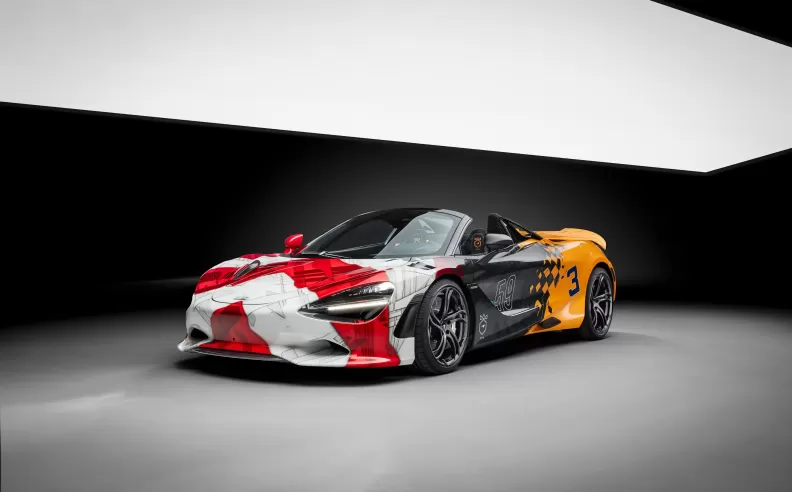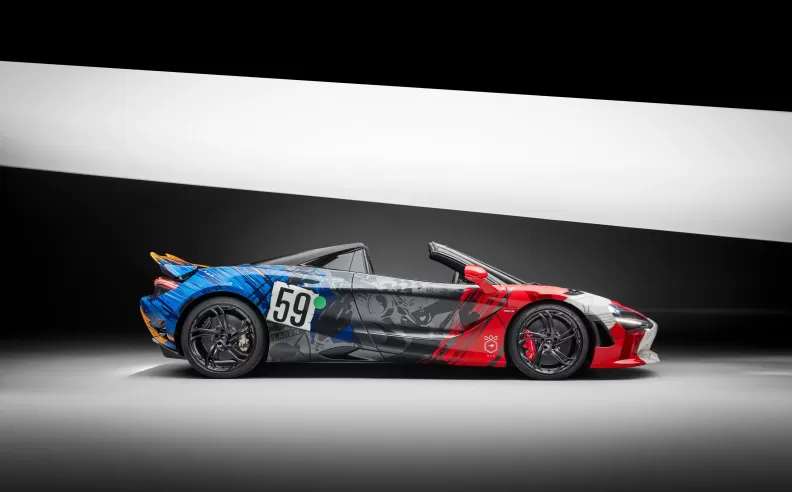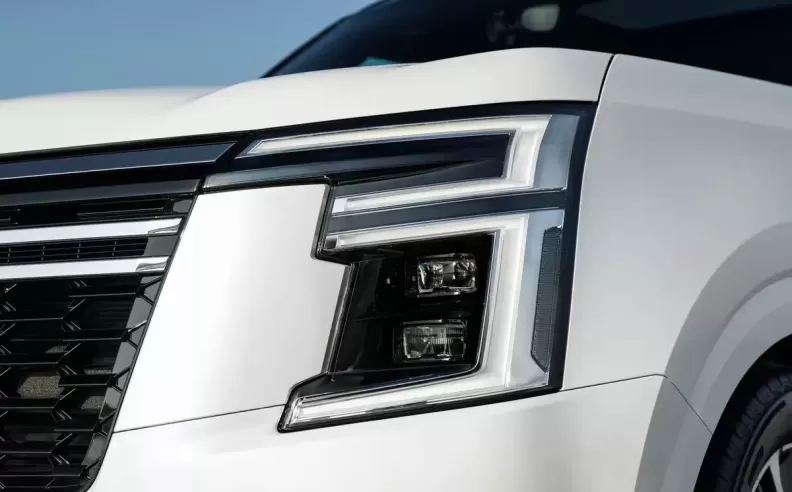
McLaren Automotive has revealed its most ambitious and exacting bespoke livery ever – the astonishingly complex 3-7-59 Theme. Realised by the expert paint technicians at McLaren Special Operations (MSO), the Theme was showcased on a very special McLaren 750S supercar unveiled today by McLaren F1 driver, Lando Norris, McLaren IndyCar driver Pato O’Ward, and former McLaren F1 driver Derek Bell, who twice competed at 24 Hours of Le Mans in a McLaren F1 GTR.

Publicly revealed at luxury motorsports festival, Velocity International, taking place at Sonoma Raceway, USA, the 3-7-59 is a stunning tribute to McLaren’s unique success in winning motorsport’s unofficial ‘Triple Crown’ of victories at the Indianapolis 500, the Monaco Grand Prix and the 24 Hours of Le Mans. Its reveal stands out as one of the most memorable moments in a year of celebrations marking the 60th anniversary of McLaren being founded, in 1963.
Requiring more than 1200 hours to paint, six customer cars wearing unique variations of the 3-7-59 Theme will be created, all either a 750S coupe or Spider, and all already sold.
"As we celebrate the 60th anniversary of McLaren being founded, we of course reflect on our legacy of pushing boundaries, both in motorsport and more recently in supercar and hypercar excellence. The 3-7-59 Theme takes inspiration from both of these areas, as a showcase of extreme performance that pays tribute to our Triple Crown success. The most challenging project ever delivered by McLaren Special Operations is a truly stunning expression of McLaren’s industry-leading paint expertise, on a supercar that sets a new benchmark in its class.”
Michael Leiters, Chief Executive Officer, McLaren Automotive
The 3-7-59 Theme name is a reference to the race numbers worn by the victorious McLarens in each of the three Triple Crown victories: the ‘3’ on the M16D driven at the 1974 Indy 500 by Johnny Rutherford; the ‘7’ from Alain Prost’s Monaco winning 1984 McLaren MP4/2; and the ‘59’ as displayed on the McLaren F1 GTR driven to victory at Le Mans in 1995 by Yannick Dalmas, Masanori Sekiya and JJ Lehto.
Just as the incredible cars that won these races and the Triple Crown achievement are both remarkable and iconic, so too is the 3-7-59 Theme that reflects the liveries of the three victorious cars and combines them into a vivid collage containing illustrated details of the three races and the cars that won them throughout.
The 3-7-59 Theme takes McLaren’s paint capabilities to new heights, incorporating more than 20 colours to create the car’s striking exterior. To achieve the astonishing depth and detail in each car, paint technicians at McLaren Special Operations have drawn on decades of combined experience and techniques developed to deliver previous one-off customer commissions.
The Triple Crown story told by the 3-7-59 Theme begins for the driver before they’ve even entered the car. The key fob wears hand-painted artwork that mimics the multi-coloured exterior of the car. The front of the car itself takes inspiration from the white and red livery of the McLaren MP4/2, with that car’s ‘7’ race number worn on the bonnet and subtly integrated into the expressive ‘shattered’ interpretation of the F1 car’s livery.
Both sides of the 3-7-59 Theme are an homage to the 1995 Le Mans winning McLaren F1 GTR, with its grey colour scheme and ‘59’ race number, and even the bright green dot displayed on the car to denote its participation in the GT1 class of the famous 24-hour race.
Other exquisite details within the paintwork that recount McLaren’s Triple Crown story include hidden ‘easter eggs’ that reference to the cars that won the races, the selected years that McLaren has been triumphant at a Triple Crown event, and the evolution of McLaren’s logo from the original McLaren Racing crest to the ‘Speedmark’ used today.
Taking inspiration from the McLaren M16D, the rear third of the 3-7-59 Theme is predominantly matched to the orange colour of the 1974 Indy 500 winner, but like the race car itself wears the number ‘3’ in blue. On the side featuring the M16D’s race number, the orange paint transitions into the F1 GTR’s grey scheme through a swirling chequered flag effect, painted to perfection with incredible attention to detail.
On the other side of the car, a twist has been applied using a new technique developed by MSO: a striking blue ‘splash’ inspired by the colour of the race number and created using a vector process bursts across the car. This process uses a scanned splash created on canvas as a template for the paint effect, which is then upscaled. The use of four shades of blue within the splash give it a three-dimensional look, despite remaining completely flush with the surface of the car.
The Satin Black ultra-lightweight Vortex alloy wheels shroud alternating brake calipers finished in finished in blue, red and Le Mans Gold, in a further reference of the three Triple Crown winning cars.
Beyond the breathtaking craftsmanship exhibited on the 3-7-59’s body, MSO technicians have also included hidden and interactive new features. There are three QR codes within the livery – on the exterior and the interior – each of which provides a live portal to a webpage detailing the car. In a particular light and certain angle, a reflected ‘3-7-59’ motif shines on the bracket housing the LED running lights within the headlight mounting. And at the rear, an electrochromic MSO logo illuminates within the brake light mounted on the underside of the airbrake.
Experimenting with new materials, McLaren has created exterior detailing made from silver leaf. Located on the lower door on both sides of the 750S with 3-7-59 Theme and applied using gilding techniques developed in-house by McLaren to achieve its own desired effect, a Triple Crown logo in silver with a wonderful patina finish is found – one of several special applications of the mark throughout the vehicle.
Triple Crown logo designs are incorporated into the interior of the car, stitched in McLaren Orange into the headrests of the car’s standard Carbon Fibre Racing Seats and debossed into the centre armrest. The seats feature further Triple Crown art that is etched in graphite Alcantara and are finished with white contrast stitching.
The interior is also home to visual carbon fibre door trim painted with the same artwork that features on the seats; a painted 12 o’clock marker on the steering wheel rim; and hand-painted extended carbon fibre shift paddles inspired by the red and white ‘shattered’ paintwork adorning the 3-7-59’s nose as a tribute to the McLaren MP4/2.
Even beyond eyesight level, the 3-7-59 wears unique features. The pedals, which are marked with laser etched artwork matching some of the paint details on the exterior of the car, are finished with a ceramic coating and white, black and orange Triple Crown stars. The same stars are painted onto the visual carbon fibre doorsills. A third hidden detail is found once the doors are open - the car’s dedication plaque, which is a unique and special tribute to McLaren’s success in Formula 1 and the Monaco Grand Prix and features a genuine piece of red and white McLaren Formula 1 car carbon fibre bodywork.

Motor 283 is the biggest automotive website created by a team of automotive enthusiats and this author page is used to show the readers the press releases and news posted on Motor 283 website.
